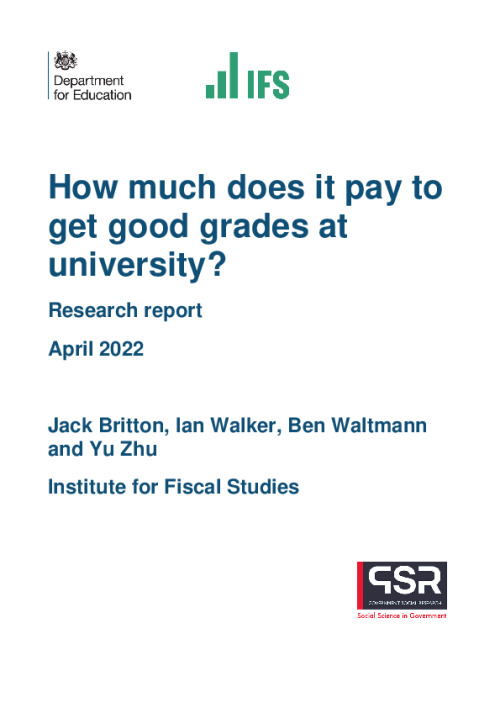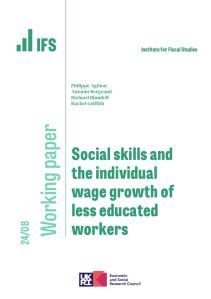We investigate variation in early-career earnings by degree class outcome using the Department for Education’s Longitudinal Education Outcomes (LEO) dataset. The LEO dataset links school records, university records and tax records for everyone who took GCSEs in England since 2002. Using these data, we can estimate degree class earnings premiums up to age 30, controlling for a large array of background characteristics including detailed measures of school attainment. Our main findings are:
- The share of university students obtaining different degree classes varies substantially by subject studied and institution attended. Among the 2012–2015 cohorts of graduates, around 20% obtained first class degrees; just over half received upper second class degrees; around 20% received lower second degrees; and around 5% received lower class degrees. Subjects involving maths have a more even spread of awards across degree classes than other subjects. More selective universities tend to award higher class degrees.
- There has been a long-term trend towards higher degree classes awarded in all subjects and at all levels of university selectivity, which accelerated around the 2010 graduation year. The share of people getting first class degrees more than trebled between the 1999 and 2015 graduating cohorts. Meanwhile, the share of 2.1s remained fairly flat; the biggest declines were in the share of people getting 2.2s.
- Earnings differences between those graduating with different degree classes are large. Five years after graduation, median annual pre-tax earnings for both women and men who obtained a lower second class degree in 2013 were around £3,800 lower than for those who received an upper second class degree (or around 15% lower for women and around 13% for men). Women who obtained first class degrees earned around £2,200 (8%) more than women with upper second class degrees, and men with first class degrees earned £4,100 (14%) more than men who obtained upper second class degrees.
- Even after controlling for other observable characteristics, earnings differences between degree classes are substantial for both women and men. Conditional on observable characteristics, the premium of gaining a first class degree over an upper second is 3.5% for women and 7.0% for men. A lower second class degree is associated with 6.9% lower earnings compared with an upper second for women and 10.9% lower earnings for men. Obtaining a lower class degree is associated with 14.7% lower earnings for women and 18.3% lower earnings for men, again compared with a 2.1.
- Payoffs for a higher degree class vary hugely by subject. For some subjects, degree class matters a lot for earnings, while for others it does not matter at all. For men and women studying law or economics, getting a lower second class degree rather than an upper second is associated with more than 15% lower earnings, whereas there is no significant difference for those studying education or English. Subjects with high labour market returns tend to have high degree class premiums and subjects with low labour market returns tend to have low degree class premiums. This suggests that even students of high-return subjects typically need to get at least a 2.1 in order to access highly paid jobs (a notable exception is medicine, a high-return subject which does not usually award degree classifications).
- Achieving at least a 2.1 has a much bigger payoff at more selective universities. Controlling for observable characteristics, both men and women who obtain a lower second class degree from the most selective universities earn 20% less on average at age 30 than those who achieve an upper second class degree, compared with around 6% for women and 8% for men who got lower second class degrees from the least selective universities.
- There are stark gender differences in the payoff to achieving a first class degree at a very selective university. At the most selective universities (Oxford, Cambridge, Imperial College London and the London School of Economics), the average payoff to a first class degree versus a 2.1 is near zero for women, but very large at around 14% for men.
- Despite substantial increases in the average grades of graduates during the period we study, there are no large changes in raw or conditional degree class premiums over time. Median graduate earnings five years after graduation fell by more than £5,000 between the 2002 and 2009 graduation cohorts in all degree classes for both women and men. Yet earnings gaps between degree classes have been constant throughout the period we study. This is consistent both with improvements in overall student attainment and with lower academic standards, as lower standards would likely have affected all degree classes, potentially leaving gaps in attainment and thus earnings between degree classes roughly unchanged.












